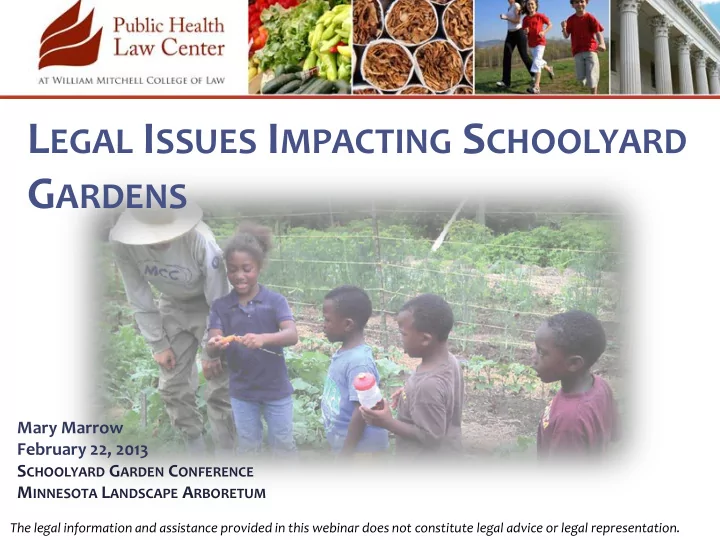

L EGAL I SSUES I MPACTING S CHOOLYARD G ARDENS Mary Marrow February 22, 2013 S CHOOLYARD G ARDEN C ONFERENCE M INNESOTA L ANDSCAPE A RBORETUM The legal information and assistance provided in this webinar does not constitute legal advice or legal representation.
T HE P UBLIC H EALTH L AW C ENTER
T HE P UBLIC H EALTH L AW C ENTER We do: We don’t: • Legal research • Direct representation • Policy development • Lobby • Publications • Trainings
K EY L EGAL I SSUES 1. Liability related to garden food and activities 2. Risk management for school gardens 3. Governmental immunity for schools 4. School wellness policies 5. Using school garden produce in the cafeteria 6. Curriculum standards
1. L IABILITY : G ENERAL Photo courtesy of Dave Nicoll, flickr.com
W HAT IS L IABILITY & W HY D OES IT M ATTER ? Liability: civil responsibility for an injury that occurred based on your action or inaction. Photo courtesy of stepnout, flickr.com
E LEMENTS OF L IABILITY 1. Duty of care. 2. Breach of duty. 3. Injury. 4. Causation. T ORT : A CIVIL WRONGDOING . The action that exposes you to liability concerns. A person injured in tort can sue for damages related to their injury .
L IABILITY AND S CHOOLYARD G ARDENS Physical Injury from Garden Activity Injury from Food Consumption
L IABILITY : P HYSICAL I NJURY FROM G ARDEN A CTIVITY
L IABILITY : P HYSICAL I NJURY FROM F OOD C ONSUMPTION
2. R ISK M ANAGEMENT AND B EST P RACTICES Education/Training Good Planning Garden Safety Protocols Good Policy Drafting Waivers Contracts Insurance
3. G OVERNMENTAL I MMUNITY Who is covered? Municipalities School districts Cities Counties. Employees, officers, or agents within scope of employment Can include volunteers Not covered: Independent contractors Those acting outside the scope of their employment
I MMUNITY : T HINGS THE C OURTS L OOK F OR Written Policies History of Accidents Complaints or Comments about Safety Results of Safety Inspections Common Usage Existing Standards
M UNICIPAL T ORT C APS ( see Minn. Stat. §466.04) Limit Liability Exposure $500,000 per individual $1,500,000 per event Exceptions exist
4. S CHOOL W ELLNESS P OLICIES Photo courtesy of Columbia Heights School District
S CHOOL W ELLNESS P OLICIES 533.1 WELLNESS I. Purpose The purpose of this policy is to assure a school environment that promotes and protects students’ health, well -being, and ability to learn by supporting healthy eating and physical activity. ……………………………. E. School Gardens 1. To the extent funding is available and as approved by the school board, the school district will support the use of school property to promote nutrition, physical activity, and curricular and co-curricular activities through school gardens. The school district will support the sustainability of school gardens through activities including, but not limited to, fundraising, solicitation of community donations, use of existing resources, and allocation of school district funds. 2. School gardens give students the opportunity to experience planting, harvesting, preparing, serving, and tasting self-grown food that reflects the ethnic and cultural diversity of the student population. The school district supports the incorporation of school gardens into the standards-based curriculum as a hands-on, interdisciplinary teaching tool to influence student food choices and lifelong eating habits.
5. I NTEGRATING SCHOOL GARDEN FOOD INTO FEDERAL SCHOOL NUTRITION PROGRAMS
U SING G ARDEN P RODUCE IN THE C AFETERIA • Salad bars. • Main dish items. • Side dishes/a la carte.
F OOD S AFETY AND S CHOOL G ARDEN P RODUCE Follow established food handling practices Considerations: • Site selection. • Using safe materials and water. • Safe growing techniques. • Safe harvesting techniques. • Safe storage.
6. C URRICULUM S TANDARDS Gardens can serve as the basis for lessons in a wide range of subjects.
A DDITIONAL R ESOURCES
Questions www.publichealthlawcenter.org
Recommend
More recommend